The Cambridge History of Japan, Vol. 4: Early Modern Japan
Подождите немного. Документ загружается.

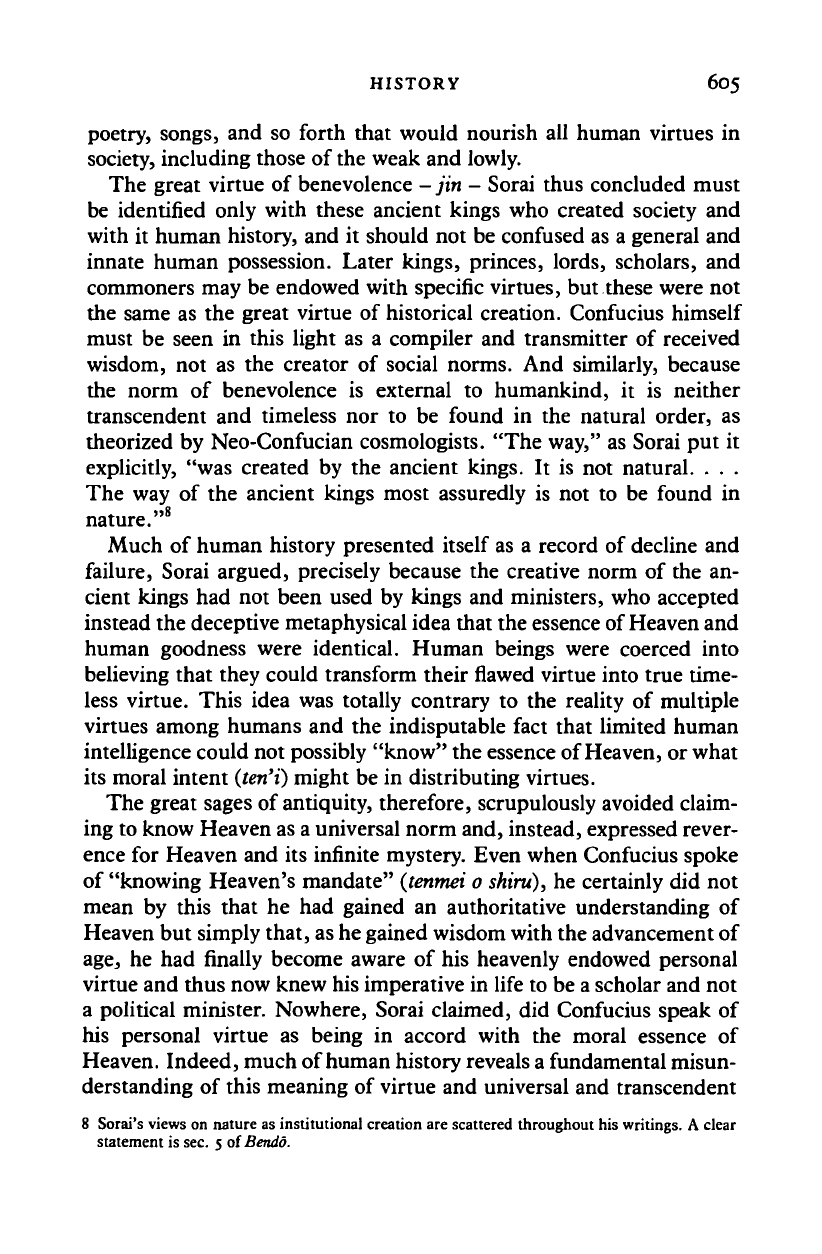
HISTORY 605
poetry, songs, and so forth that would nourish all human virtues in
society, including those of the weak and lowly.
The great virtue of benevolence - jin - Sorai thus concluded must
be identified only with these ancient kings who created society and
with it human history, and it should not be confused as a general and
innate human possession. Later kings, princes, lords, scholars, and
commoners may be endowed with specific virtues, but these were not
the same as the great virtue of historical creation. Confucius himself
must be seen in this light as a compiler and transmitter of received
wisdom, not as the creator of social norms. And similarly, because
the norm of benevolence is external to humankind, it is neither
transcendent and timeless nor to be found in the natural order, as
theorized by Neo-Confucian cosmologists. "The way," as Sorai put it
explicitly, "was created by the ancient kings. It is not natural. . . .
The way of the ancient kings most assuredly is not to be found in
nature."
8
Much of human history presented itself as a record of decline and
failure, Sorai argued, precisely because the creative norm of the an-
cient kings had not been used by kings and ministers, who accepted
instead the deceptive metaphysical idea that the essence of Heaven and
human goodness were identical. Human beings were coerced into
believing that they could transform their flawed virtue into true time-
less virtue. This idea was totally contrary to the reality of multiple
virtues among humans and the indisputable fact that limited human
intelligence could not possibly "know" the essence of Heaven, or what
its moral intent
(ten'i)
might be in distributing virtues.
The great sages of antiquity, therefore, scrupulously avoided claim-
ing to know Heaven as a universal norm and, instead, expressed rever-
ence for Heaven and its infinite mystery. Even when Confucius spoke
of "knowing Heaven's mandate"
(tenmei
0
shiru),
he certainly did not
mean by this that he had gained an authoritative understanding of
Heaven but simply that, as he gained wisdom with the advancement of
age,
he had finally become aware of his heavenly endowed personal
virtue and thus now knew his imperative in life to be a scholar and not
a political minister. Nowhere, Sorai claimed, did Confucius speak of
his personal virtue as being in accord with the moral essence of
Heaven. Indeed, much of human history reveals a fundamental misun-
derstanding of this meaning of virtue and universal and transcendent
8 Sorai's views on nature as institutional creation are scattered throughout his writings. A clear
statement is sec. 5 of Bendo.
Cambridge Histories Online © Cambridge University Press, 2008
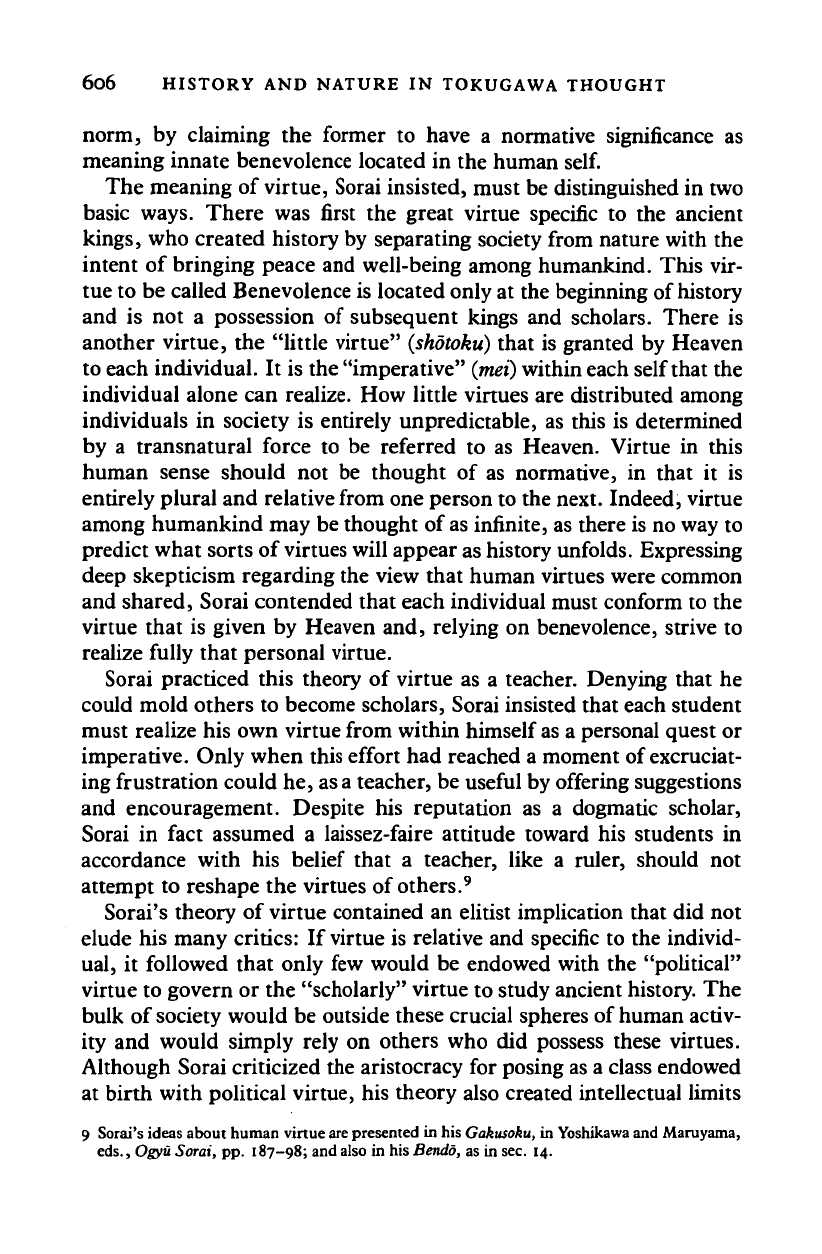
606 HISTORY AND NATURE IN TOKUGAWA THOUGHT
norm,
by
claiming
the
former
to
have
a
normative significance
as
meaning innate benevolence located
in
the human
self.
The meaning
of
virtue, Sorai insisted, must be distinguished
in
two
basic ways. There
was
first
the
great virtue specific
to the
ancient
kings,
who created history by separating society from nature with
the
intent
of
bringing peace and well-being among humankind. This
vir-
tue to be called Benevolence is located only
at
the beginning of history
and
is not a
possession
of
subsequent kings
and
scholars. There
is
another virtue,
the
"little virtue"
(shotoku)
that
is
granted
by
Heaven
to each individual.
It
is the "imperative"
(met)
within each self that the
individual alone
can
realize. How little virtues are distributed among
individuals
in
society
is
entirely unpredictable,
as
this
is
determined
by
a
transnatural force
to be
referred
to as
Heaven. Virtue
in
this
human sense should
not be
thought
of as
normative,
in
that
it is
entirely plural and relative from one person to the next. Indeed, virtue
among humankind may be thought
of
as
infinite, as there is no way
to
predict what sorts
of
virtues will appear as history unfolds. Expressing
deep skepticism regarding the view that human virtues were common
and shared, Sorai contended that each individual must conform to
the
virtue that
is
given
by
Heaven and, relying
on
benevolence, strive
to
realize fully that personal virtue.
Sorai practiced this theory
of
virtue
as a
teacher. Denying that
he
could mold others
to
become scholars, Sorai insisted that each student
must realize his own virtue from within himself
as
a
personal quest
or
imperative. Only when this effort had reached
a
moment of excruciat-
ing frustration could he, as
a
teacher, be useful by offering suggestions
and encouragement. Despite
his
reputation
as a
dogmatic scholar,
Sorai
in
fact assumed
a
laissez-faire attitude toward
his
students
in
accordance with
his
belief that
a
teacher, like
a
ruler, should
not
attempt
to
reshape
the
virtues
of
others.
9
Sorai's theory
of
virtue contained
an
elitist implication that
did not
elude
his
many critics:
If
virtue
is
relative
and
specific
to the
individ-
ual,
it
followed that only
few
would
be
endowed with
the
"political"
virtue
to
govern
or
the "scholarly" virtue to study ancient history.
The
bulk
of
society would be outside these crucial spheres
of
human activ-
ity
and
would simply rely
on
others
who did
possess these virtues.
Although Sorai criticized the aristocracy
for
posing as a class endowed
at birth with political virtue, his theory also created intellectual limits
9 Sorai's ideas about human virtue are presented in his
Gakusoku,
in
Yoshikawa and Maruyama,
eds.,
Ogyu
Sorai,
pp. 187-98; and also
in
his
Bendo,
as
in
sec.
14.
Cambridge Histories Online © Cambridge University Press, 2008
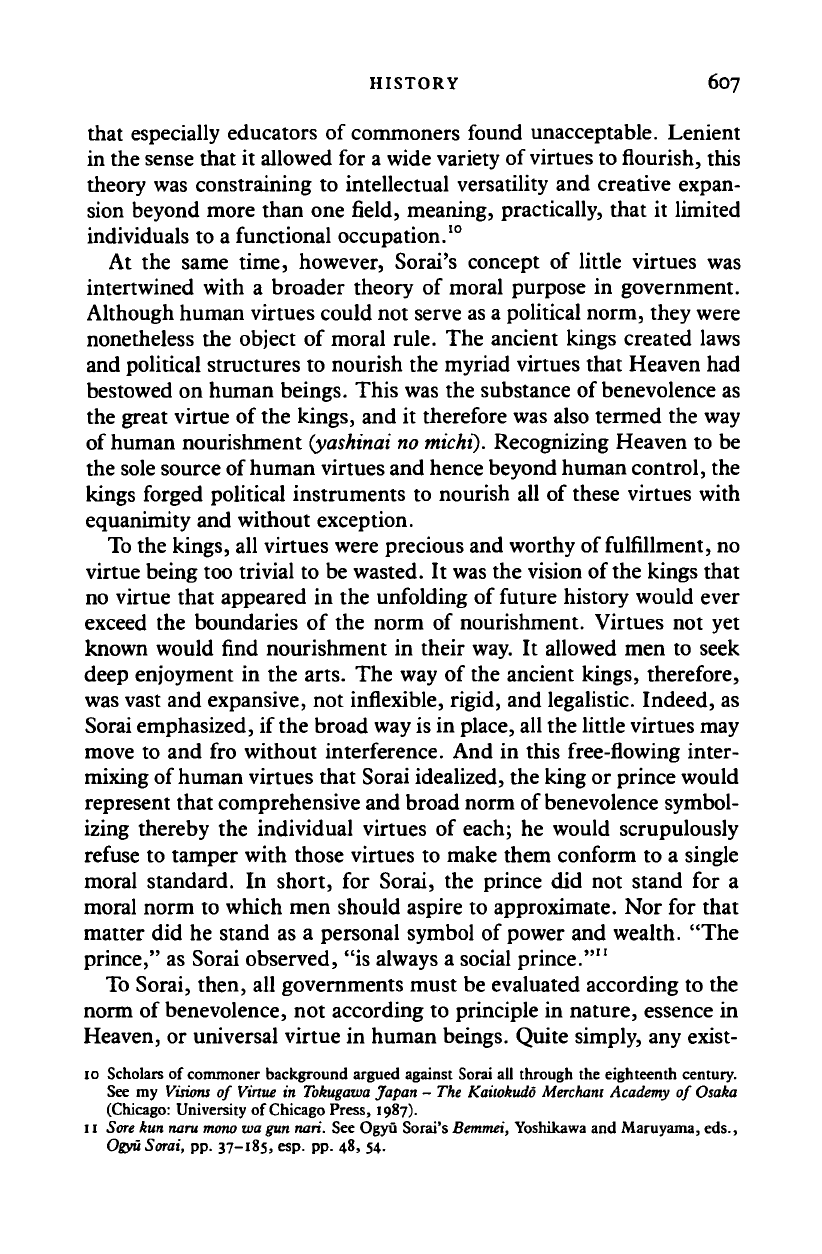
HISTORY 607
that especially educators of commoners found unacceptable. Lenient
in the sense that it allowed for a wide variety of virtues to flourish, this
theory was constraining to intellectual versatility and creative expan-
sion beyond more than one field, meaning, practically, that it limited
individuals to a functional occupation.
10
At the same time, however, Sorai's concept of little virtues was
intertwined with a broader theory of moral purpose in government.
Although human virtues could not serve as a political norm, they were
nonetheless the object of moral rule. The ancient kings created laws
and political structures to nourish the myriad virtues that Heaven had
bestowed on human beings. This was the substance of benevolence as
the great virtue of the kings, and it therefore was also termed the way
of human nourishment
(yashinai no
michi).
Recognizing Heaven to be
the sole source of human virtues and hence beyond human control, the
kings forged political instruments to nourish all of these virtues with
equanimity and without exception.
To the kings, all virtues were precious and worthy of fulfillment, no
virtue being too trivial to be wasted. It was the vision of the kings that
no virtue that appeared in the unfolding of future history would ever
exceed the boundaries of the norm of nourishment. Virtues not yet
known would find nourishment in their way. It allowed men to seek
deep enjoyment in the arts. The way of the ancient kings, therefore,
was vast and expansive, not inflexible, rigid, and legalistic. Indeed, as
Sorai emphasized, if the broad way is in place, all the little virtues may
move to and fro without interference. And in this free-flowing inter-
mixing of human virtues that Sorai idealized, the king or prince would
represent that comprehensive and broad norm of benevolence symbol-
izing thereby the individual virtues of each; he would scrupulously
refuse to tamper with those virtues to make them conform to a single
moral standard. In short, for Sorai, the prince did not stand for a
moral norm to which men should aspire to approximate. Nor for that
matter did he stand as a personal symbol of power and wealth. "The
prince," as Sorai observed, "is always a social prince.""
To Sorai, then, all governments must be evaluated according to the
norm of benevolence, not according to principle in nature, essence in
Heaven, or universal virtue in human beings. Quite simply, any exist-
10 Scholars of commoner background argued against Sorai all through the eighteenth century.
See my Visions of
Virtue
in Tokugawa Japan - The Kaitokudo Merchant Academy of Osaka
(Chicago: University of Chicago Press, 1987).
11 Sore kun naru
mono
via gun nari. See Ogyu Sorai's Bemmei, Yoshikawa and Maruyama, eds.,
Ogyu Sorai, pp. 37-185, esp. pp. 48, 54.
Cambridge Histories Online © Cambridge University Press, 2008
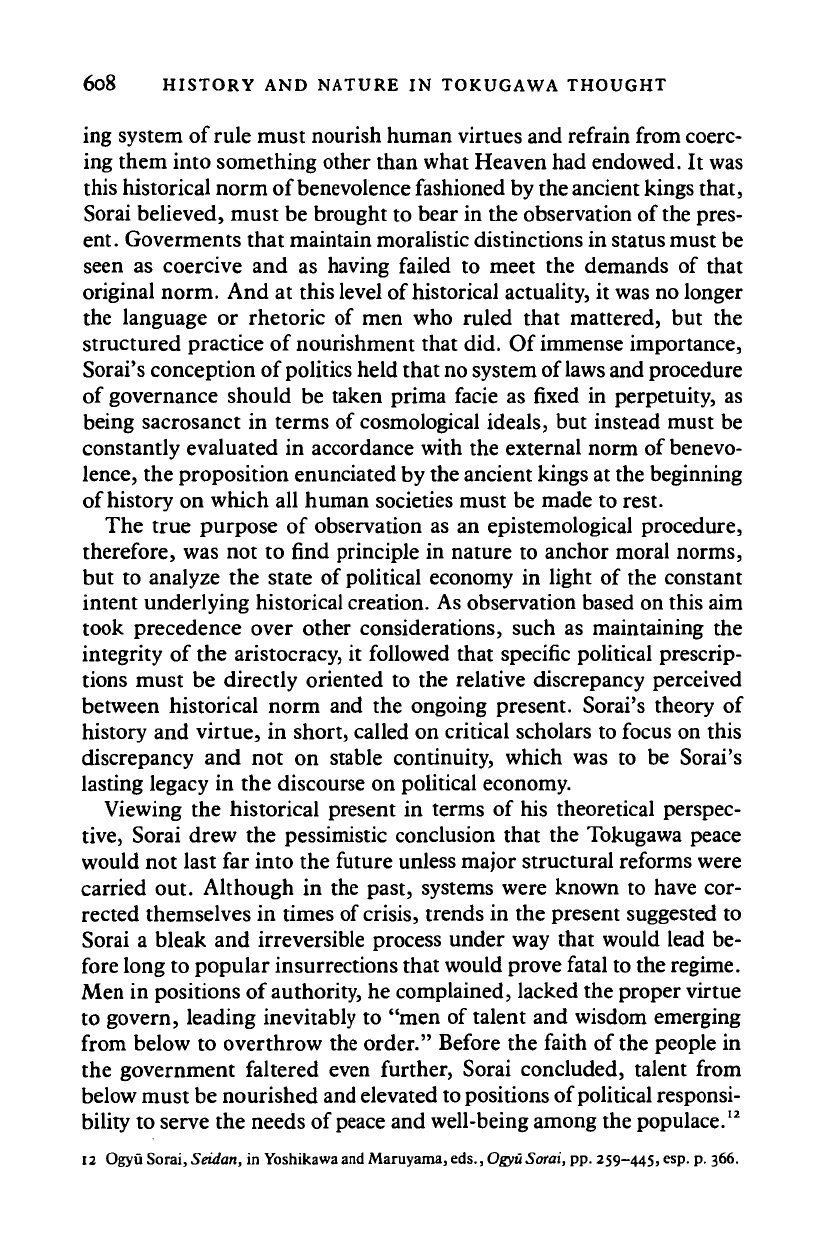
608 HISTORY AND NATURE IN TOKUGAWA THOUGHT
ing system of rule must nourish human virtues and refrain from coerc-
ing them into something other than what Heaven had endowed. It was
this historical norm of benevolence fashioned by the ancient kings that,
Sorai believed, must be brought to bear in the observation of the pres-
ent. Goverments that maintain moralistic distinctions in status must be
seen as coercive and as having failed to meet the demands of that
original norm. And at this level of historical actuality, it was no longer
the language or rhetoric of men who ruled that mattered, but the
structured practice of nourishment that did. Of immense importance,
Sorai's conception of politics held that no system of laws and procedure
of governance should be taken prima facie as fixed in perpetuity, as
being sacrosanct in terms of cosmological ideals, but instead must be
constantly evaluated in accordance with the external norm of benevo-
lence, the proposition enunciated by the ancient kings at the beginning
of history on which all human societies must be made to rest.
The true purpose of observation as an epistemological procedure,
therefore, was not to find principle in nature to anchor moral norms,
but to analyze the state of political economy in light of the constant
intent underlying historical creation. As observation based on this aim
took precedence over other considerations, such as maintaining the
integrity of the aristocracy, it followed that specific political prescrip-
tions must be directly oriented to the relative discrepancy perceived
between historical norm and the ongoing present. Sorai's theory of
history and virtue, in short, called on critical scholars to focus on this
discrepancy and not on stable continuity, which was to be Sorai's
lasting legacy in the discourse on political economy.
Viewing the historical present in terms of his theoretical perspec-
tive,
Sorai drew the pessimistic conclusion that the Tokugawa peace
would not last far into the future unless major structural reforms were
carried out. Although in the past, systems were known to have cor-
rected themselves in times of
crisis,
trends in the present suggested to
Sorai a bleak and irreversible process under way that would lead be-
fore long to popular insurrections that would prove fatal to the regime.
Men in positions of authority, he complained, lacked the proper virtue
to govern, leading inevitably to "men of talent and wisdom emerging
from below to overthrow the order." Before the faith of the people in
the government faltered even further, Sorai concluded, talent from
below must be nourished and elevated
to
positions of political responsi-
bility to serve the needs of
peace
and well-being among the populace.
12
12 Ogyu Sorai, Seidan, in Yoshikawa and Maruyama, eds., OgyuSorai, pp. 259-445, esp. p. 366.
Cambridge Histories Online © Cambridge University Press, 2008
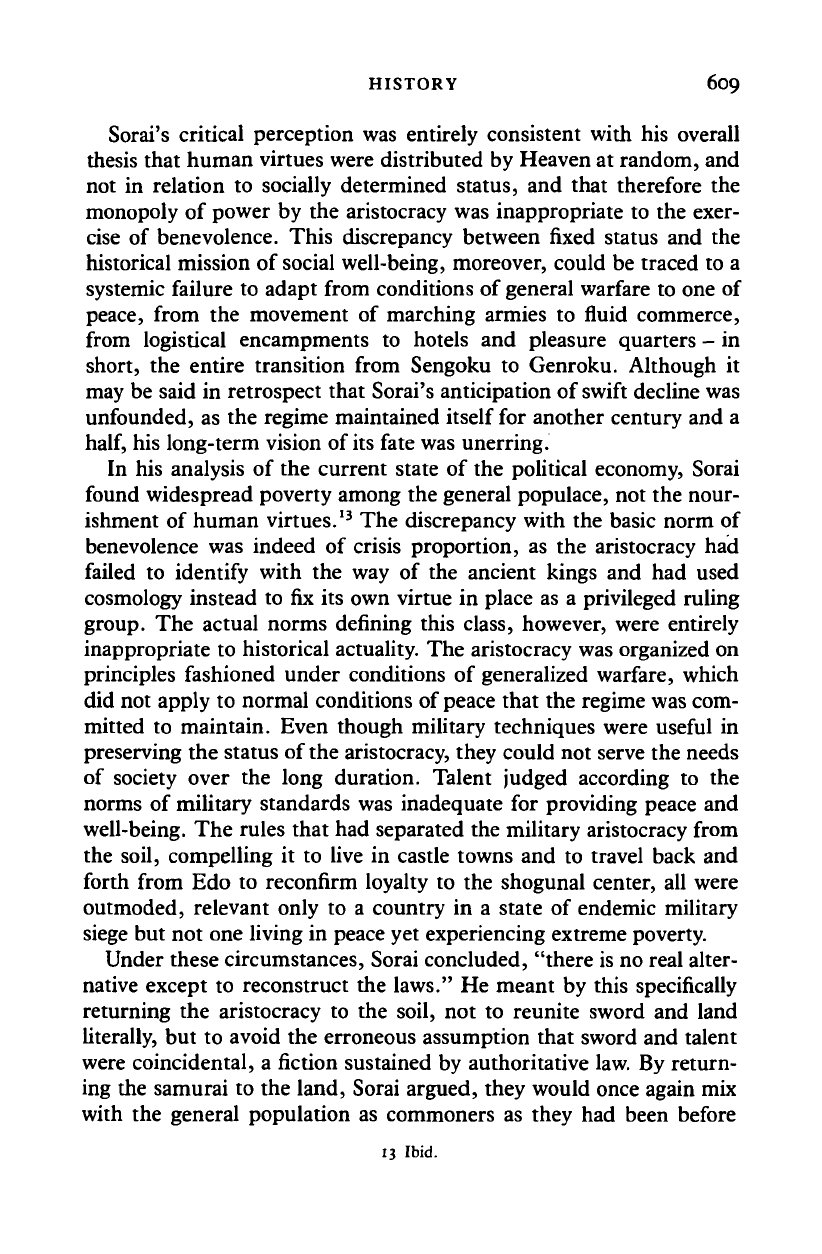
HISTORY 609
Sorai's critical perception was entirely consistent with his overall
thesis that human virtues were distributed by Heaven at random, and
not in relation to socially determined status, and that therefore the
monopoly of power by the aristocracy was inappropriate to the exer-
cise of benevolence. This discrepancy between fixed status and the
historical mission of social well-being, moreover, could be traced to a
systemic failure to adapt from conditions of general warfare to one of
peace, from the movement of marching armies to fluid commerce,
from logistical encampments to hotels and pleasure quarters - in
short, the entire transition from Sengoku to Genroku. Although it
may be said in retrospect that Sorai's anticipation of swift decline was
unfounded, as the regime maintained itself for another century and a
half,
his long-term vision of
its
fate was unerring.
In his analysis of the current state of the political economy, Sorai
found widespread poverty among the general populace, not the nour-
ishment of human virtues.
13
The discrepancy with the basic norm of
benevolence was indeed of crisis proportion, as the aristocracy had
failed to identify with the way of the ancient kings and had used
cosmology instead to fix its own virtue in place as a privileged ruling
group. The actual norms defining this class, however, were entirely
inappropriate to historical actuality. The aristocracy was organized on
principles fashioned under conditions of generalized warfare, which
did not apply to normal conditions of peace that the regime was com-
mitted to maintain. Even though military techniques were useful in
preserving the status of the aristocracy, they could not serve the needs
of society over the long duration. Talent judged according to the
norms of military standards was inadequate for providing peace and
well-being. The rules that had separated the military aristocracy from
the soil, compelling it to live in castle towns and to travel back and
forth from Edo to reconfirm loyalty to the shogunal center, all were
outmoded, relevant only to a country in a state of endemic military
siege but not one living in peace yet experiencing extreme poverty.
Under these circumstances, Sorai concluded, "there is no real alter-
native except to reconstruct the laws." He meant by this specifically
returning the aristocracy to the soil, not to reunite sword and land
literally, but to avoid the erroneous assumption that sword and talent
were coincidental, a fiction sustained by authoritative law. By return-
ing the samurai to the land, Sorai argued, they would once again mix
with the general population as commoners as they had been before
13 Ibid.
Cambridge Histories Online © Cambridge University Press, 2008
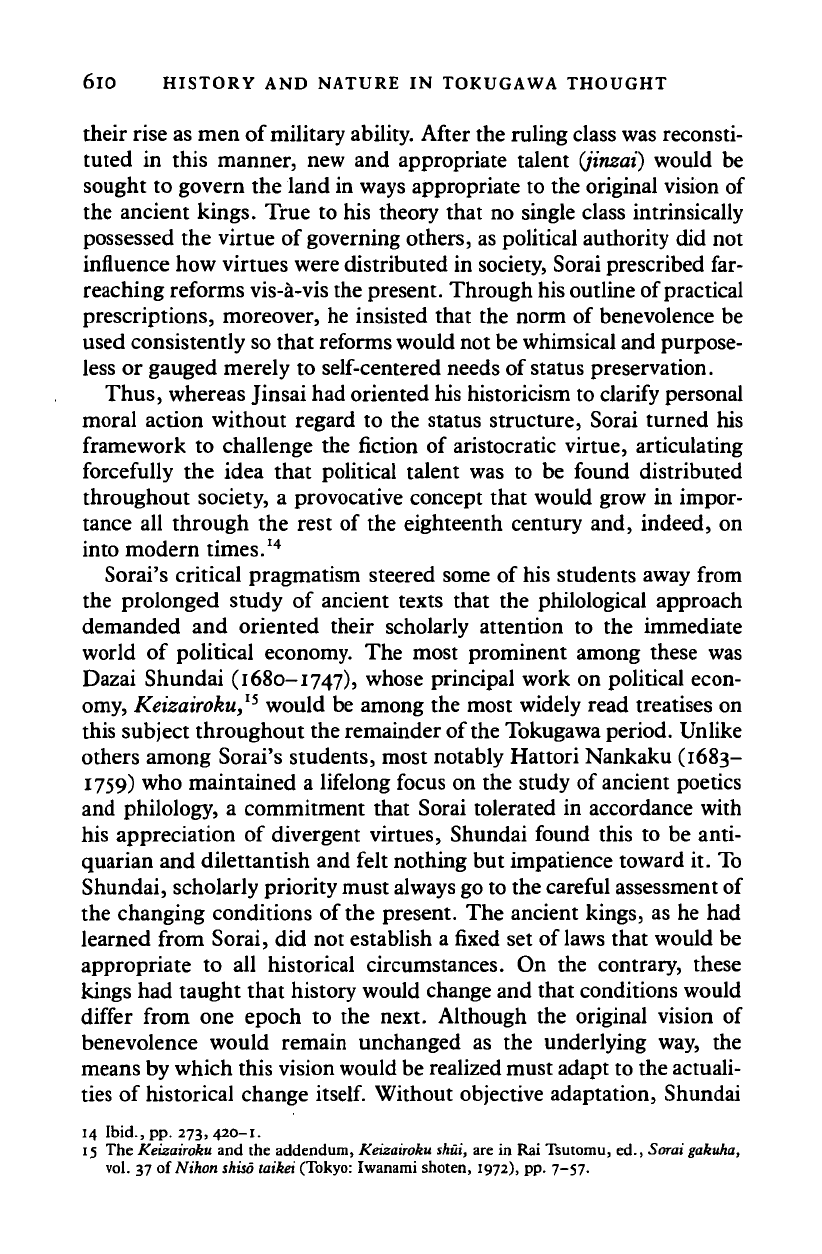
6lO HISTORY AND NATURE IN TOKUGAWA THOUGHT
their rise as men
of
military ability. After the ruling class was reconsti-
tuted
in
this manner,
new and
appropriate talent (jinzai) would
be
sought
to
govern the land
in
ways appropriate to the original vision of
the ancient kings. True
to his
theory that
no
single class intrinsically
possessed
the
virtue
of
governing others, as political authority
did
not
influence how virtues were distributed
in
society, Sorai prescribed
far-
reaching reforms vis-a-vis the present. Through his outline of practical
prescriptions, moreover,
he
insisted that
the
norm
of
benevolence
be
used consistently so that reforms would not be whimsical and purpose-
less
or
gauged merely
to
self-centered needs
of
status preservation.
Thus,
whereas Jinsai had oriented his historicism to clarify personal
moral action without regard
to the
status structure, Sorai turned
his
framework
to
challenge
the
fiction
of
aristocratic virtue, articulating
forcefully
the
idea that political talent
was to be
found distributed
throughout society,
a
provocative concept that would grow
in
impor-
tance
all
through
the
rest
of
the eighteenth century and, indeed,
on
into modern times.
14
Sorai's critical pragmatism steered some
of
his students away from
the prolonged study
of
ancient texts that
the
philological approach
demanded
and
oriented their scholarly attention
to the
immediate
world
of
political economy.
The
most prominent among these
was
Dazai Shundai (1680-1747), whose principal work
on
political econ-
omy, Keizairoku,
15
would
be
among the most widely read treatises
on
this subject throughout the remainder of
the
Tokugawa period. Unlike
others among Sorai's students, most notably Hattori Nankaku
(1683-
1759) who maintained
a
lifelong focus
on the
study
of
ancient poetics
and philology,
a
commitment that Sorai tolerated
in
accordance with
his appreciation
of
divergent virtues, Shundai found this
to be
anti-
quarian and dilettantish and felt nothing but impatience toward it.
To
Shundai, scholarly priority must always go to the careful assessment of
the changing conditions
of
the present.
The
ancient kings,
as he had
learned from Sorai,
did
not establish
a
fixed
set
of
laws
that would
be
appropriate
to all
historical circumstances.
On the
contrary, these
kings had taught that history would change and that conditions would
differ from
one
epoch
to the
next. Although
the
original vision
of
benevolence would remain unchanged
as the
underlying
way, the
means by which this vision would be realized must adapt to the actuali-
ties
of
historical change
itself.
Without objective adaptation, Shundai
14 Ibid., pp. 273,420-1.
15 The
Keizairoku
and the
addendum,
Keizairoku
shui,
are
in
Rai Tsutomu, ed.,
Sorai
gakuha,
vol.
37 ofNihon
shiso taikei
(Tokyo:
Iwanami shoten, 1972), pp. 7-57.
Cambridge Histories Online © Cambridge University Press, 2008
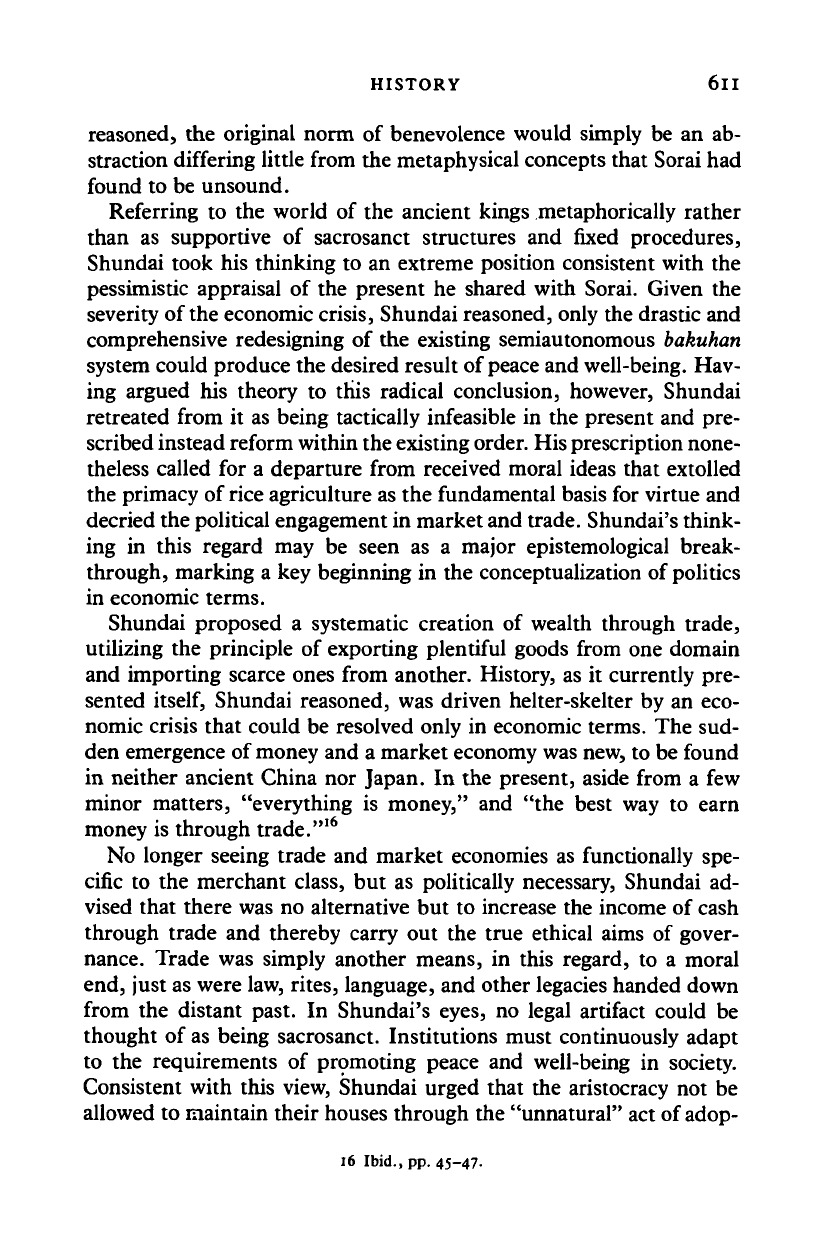
HISTORY
6ll
reasoned, the original norm of benevolence would simply be an ab-
straction differing little from the metaphysical concepts that Sorai had
found to be unsound.
Referring to the world of the ancient kings metaphorically rather
than as supportive of sacrosanct structures and fixed procedures,
Shundai took his thinking to an extreme position consistent with the
pessimistic appraisal of the present he shared with Sorai. Given the
severity of the economic crisis, Shundai reasoned, only the drastic and
comprehensive redesigning of the existing semiautonomous bakuhan
system could produce the desired result of
peace
and well-being. Hav-
ing argued his theory to this radical conclusion, however, Shundai
retreated from it as being tactically infeasible in the present and pre-
scribed instead reform within the existing
order.
His prescription none-
theless called for a departure from received moral ideas that extolled
the primacy of
rice
agriculture as the fundamental basis for virtue and
decried the political engagement in market and trade. Shundai's think-
ing in this regard may be seen as a major epistemological break-
through, marking a key beginning in the conceptualization of politics
in economic terms.
Shundai proposed a systematic creation of wealth through trade,
utilizing the principle of exporting plentiful goods from one domain
and importing scarce ones from another. History, as it currently pre-
sented
itself,
Shundai reasoned, was driven helter-skelter by an eco-
nomic crisis that could be resolved only in economic terms. The sud-
den emergence of money and a market economy was new, to be found
in neither ancient China nor Japan. In the present, aside from a few
minor matters, "everything is money," and "the best way to earn
money is through trade."
16
No longer seeing trade and market economies as functionally spe-
cific to the merchant class, but as politically necessary, Shundai ad-
vised that there was no alternative but to increase the income of cash
through trade and thereby carry out the true ethical aims of gover-
nance. Trade was simply another means, in this regard, to a moral
end, just as were law, rites, language, and other legacies handed down
from the distant past. In Shundai's eyes, no legal artifact could be
thought of as being sacrosanct. Institutions must continuously adapt
to the requirements of promoting peace and well-being in society.
Consistent with this view, Shundai urged that the aristocracy not be
allowed to maintain their houses through the "unnatural" act of adop-
16 Ibid., pp. 45-47.
Cambridge Histories Online © Cambridge University Press, 2008
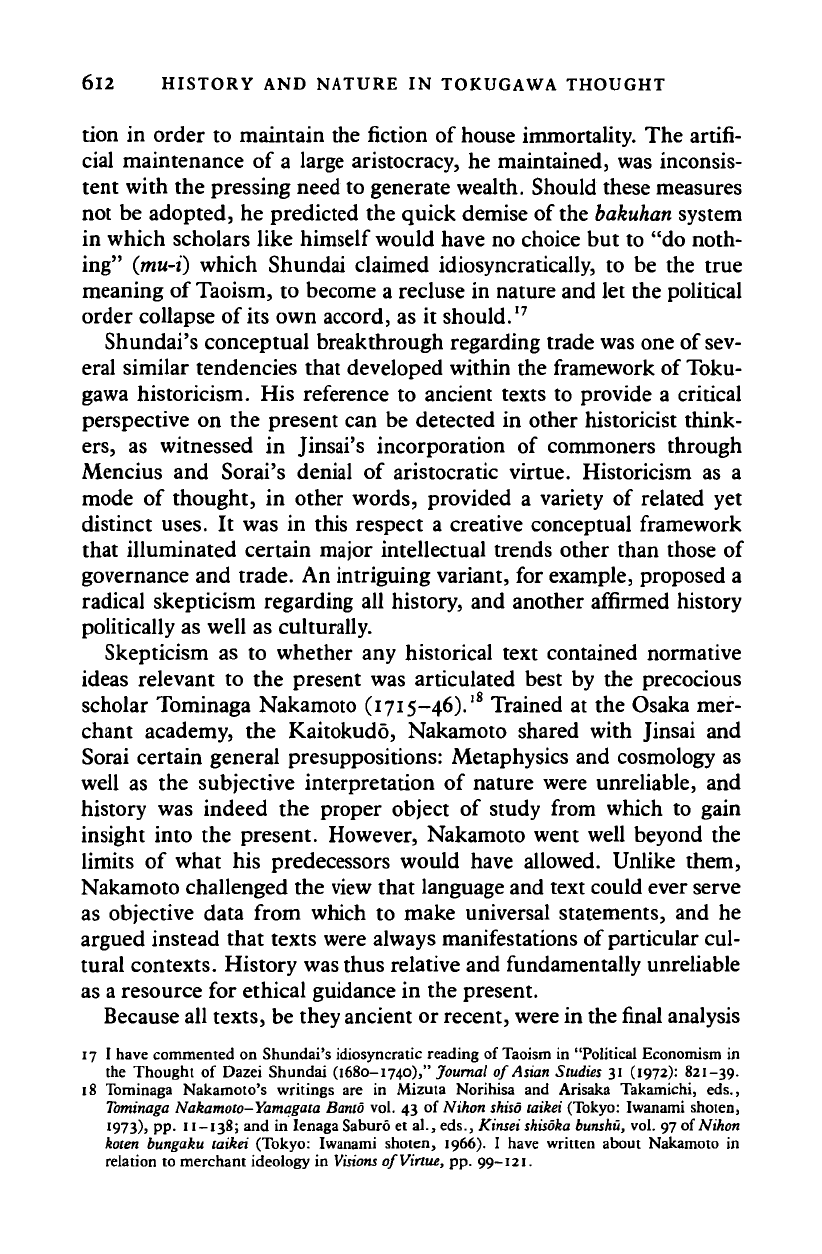
612 HISTORY AND NATURE IN TOKUGAWA THOUGHT
tion in order to maintain the fiction of house immortality. The artifi-
cial maintenance of a large aristocracy, he maintained, was inconsis-
tent with the pressing need to generate wealth. Should these measures
not be adopted, he predicted the quick demise of the
bakuhan
system
in which scholars like himself would have no choice but to "do noth-
ing" (mu-i) which Shundai claimed idiosyncratically, to be the true
meaning of Taoism, to become a recluse in nature and let the political
order collapse of its own accord, as it should.
17
Shundai's conceptual breakthrough regarding trade was one of sev-
eral similar tendencies that developed within the framework of Toku-
gawa historicism. His reference to ancient texts to provide a critical
perspective on the present can be detected in other historicist think-
ers,
as witnessed in Jinsai's incorporation of commoners through
Mencius and Sorai's denial of aristocratic virtue. Historicism as a
mode of thought, in other words, provided a variety of related yet
distinct uses. It was in this respect a creative conceptual framework
that illuminated certain major intellectual trends other than those of
governance and trade. An intriguing variant, for example, proposed a
radical skepticism regarding all history, and another affirmed history
politically as well as culturally.
Skepticism as to whether any historical text contained normative
ideas relevant to the present was articulated best by the precocious
scholar Tominaga Nakamoto (1715-46).
l8
Trained at the Osaka mer-
chant academy, the Kaitokudo, Nakamoto shared with Jinsai and
Sorai certain general presuppositions: Metaphysics and cosmology as
well as the subjective interpretation of nature were unreliable, and
history was indeed the proper object of study from which to gain
insight into the present. However, Nakamoto went well beyond the
limits of what his predecessors would have allowed. Unlike them,
Nakamoto challenged the view that language and text could ever serve
as objective data from which to make universal statements, and he
argued instead that texts were always manifestations of particular cul-
tural contexts. History was thus relative and fundamentally unreliable
as a resource for ethical guidance in the present.
Because all texts, be they ancient or recent, were in the
final
analysis
17 I have commented on Shundai's idiosyncratic reading of Taoism in "Political Economistn in
the Thought of Dazei Shundai (1680-1740)," Journal of Asian Studies 31 (1972): 821-39.
18 Tominaga Nakamoto's writings are in Mizuta Norihisa and Arisaka Takamichi, eds.,
Tominaga Nakamoto-Yamqgata Banto vol. 43 of Nihon shiso laikei (Tokyo: Iwanami shoten,
'973)> PP-
11
—138;
and in Ienaga Saburo et al., eds., Kinsei
shisoka
bunshu, vol. 97 of Nihon
koten bungaku laikei (Tokyo: Iwanami shoten, 1966). I have written about Nakamoto in
relation to merchant ideology in
Visions
of Virtue, pp.
99-121.
Cambridge Histories Online © Cambridge University Press, 2008
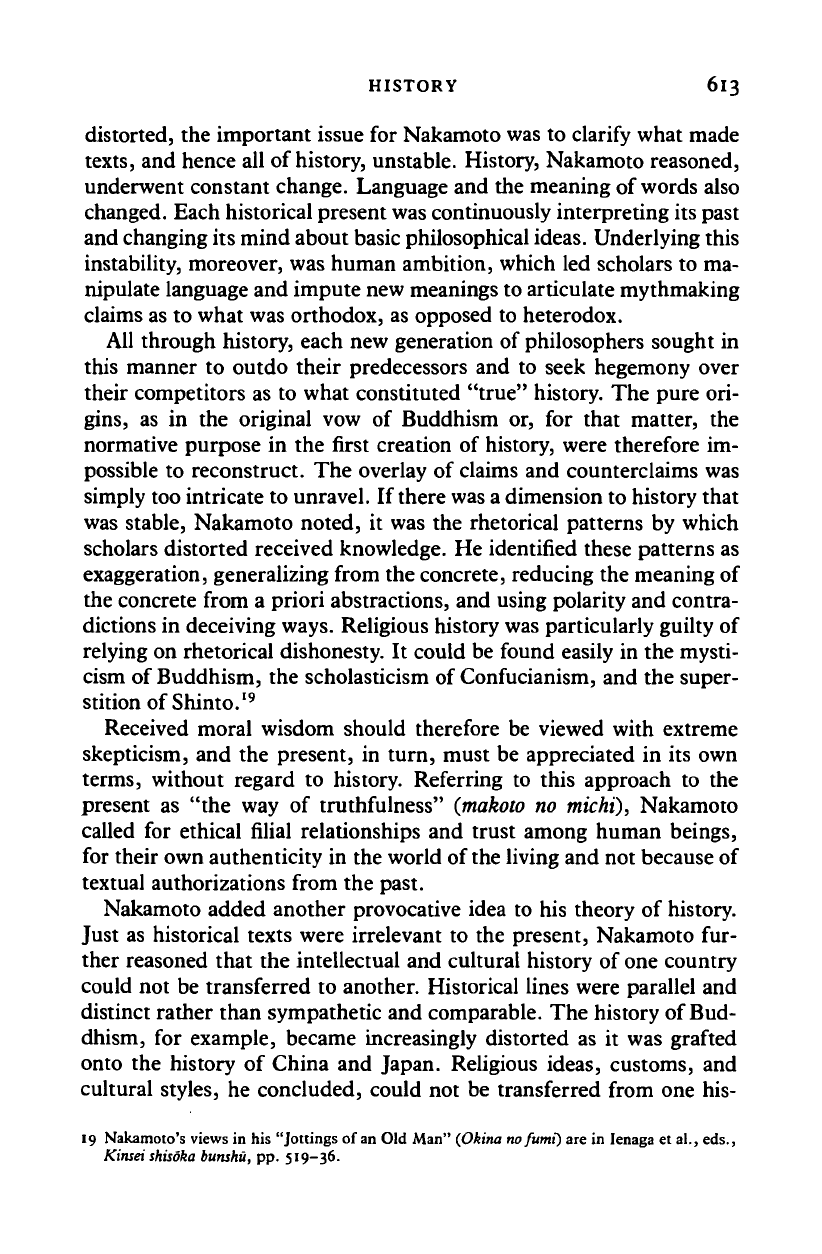
HISTORY 613
distorted, the important issue for Nakamoto was to clarify what made
texts,
and hence all of
history,
unstable. History, Nakamoto reasoned,
underwent constant change. Language and the meaning of words also
changed. Each historical present was continuously interpreting its past
and changing its mind about basic philosophical
ideas.
Underlying this
instability, moreover, was human ambition, which led scholars to ma-
nipulate language and impute new meanings to articulate mythmaking
claims as to what was orthodox, as opposed to heterodox.
All through history, each new generation of philosophers sought in
this manner to outdo their predecessors and to seek hegemony over
their competitors as to what constituted "true" history. The pure ori-
gins,
as in the original vow of Buddhism or, for that matter, the
normative purpose in the first creation of history, were therefore im-
possible to reconstruct. The overlay of claims and counterclaims was
simply too intricate to unravel. If there was a dimension to history that
was stable, Nakamoto noted, it was the rhetorical patterns by which
scholars distorted received knowledge. He identified these patterns as
exaggeration, generalizing from the concrete, reducing the meaning of
the concrete from a priori abstractions, and using polarity and contra-
dictions in deceiving ways. Religious history was particularly guilty of
relying on rhetorical dishonesty. It could be found easily in the mysti-
cism of Buddhism, the scholasticism of Confucianism, and the super-
stition of Shinto.
19
Received moral wisdom should therefore be viewed with extreme
skepticism, and the present, in turn, must be appreciated in its own
terms,
without regard to history. Referring to this approach to the
present as "the way of truthfulness"
(makoto
no michi), Nakamoto
called for ethical filial relationships and trust among human beings,
for their own authenticity in the world of
the
living and not because of
textual authorizations from the past.
Nakamoto added another provocative idea to his theory of history.
Just as historical texts were irrelevant to the present, Nakamoto fur-
ther reasoned that the intellectual and cultural history of one country
could not be transferred to another. Historical lines were parallel and
distinct rather than sympathetic and comparable. The history of Bud-
dhism, for example, became increasingly distorted as it was grafted
onto the history of China and Japan. Religious ideas, customs, and
cultural styles, he concluded, could not be transferred from one his-
19 Nakamoto's views in his "Jottings of an Old Man" (Okina rwfumi) are in Ienaga et al., eds.,
Kinsei
shisoka
bunshu, pp. 519-36.
Cambridge Histories Online © Cambridge University Press, 2008
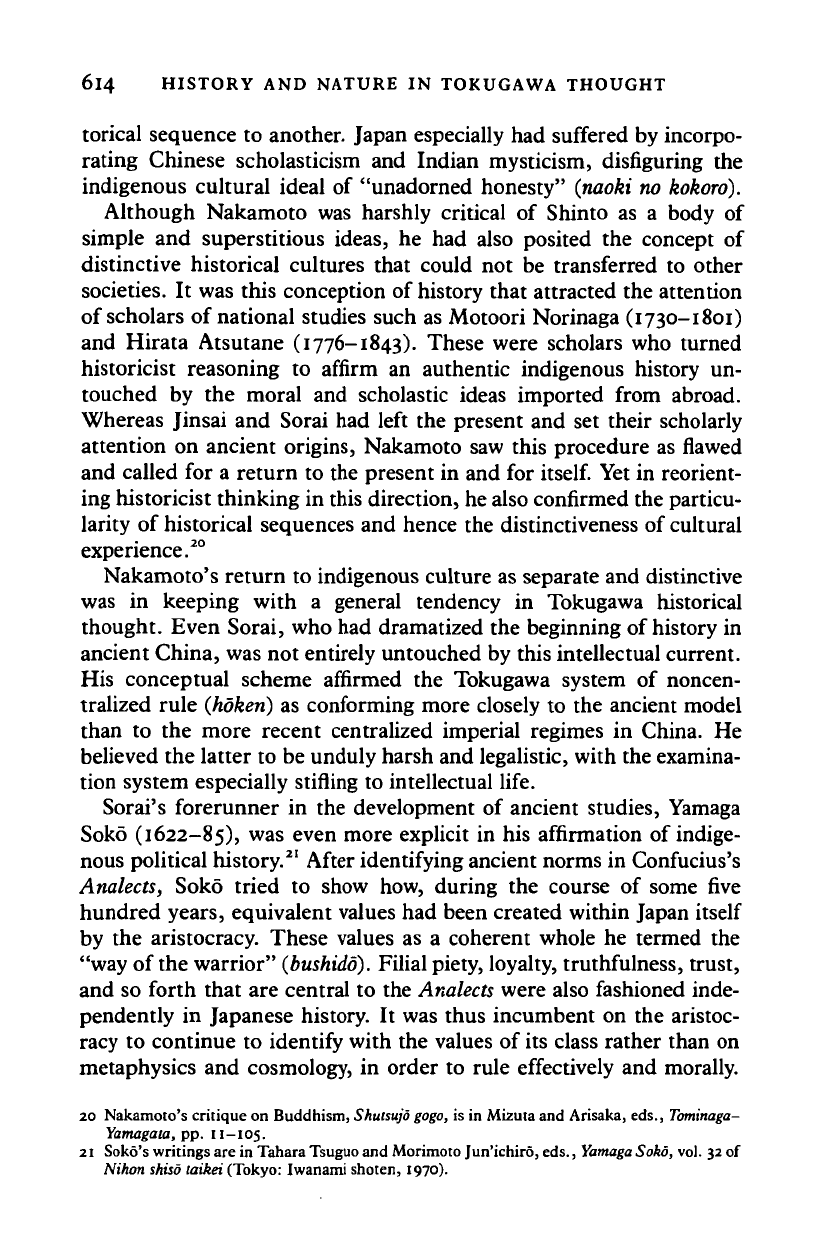
614 HISTORY AND NATURE IN TOKUGAWA THOUGHT
torical sequence to another. Japan especially had suffered by incorpo-
rating Chinese scholasticism and Indian mysticism, disfiguring the
indigenous cultural ideal of "unadorned honesty"
{naoki
no
kokoro).
Although Nakamoto was harshly critical of Shinto as a body of
simple and superstitious ideas, he had also posited the concept of
distinctive historical cultures that could not be transferred to other
societies. It was this conception of history that attracted the attention
of scholars of national studies such as Motoori Norinaga (1730-1801)
and Hirata Atsutane (1776-1843). These were scholars who turned
historicist reasoning to affirm an authentic indigenous history un-
touched by the moral and scholastic ideas imported from abroad.
Whereas Jinsai and Sorai had left the present and set their scholarly
attention on ancient origins, Nakamoto saw this procedure as flawed
and called for a return to the present in and for
itself.
Yet in reorient-
ing historicist thinking in this direction, he also confirmed the particu-
larity of historical sequences and hence the distinctiveness of cultural
experience.
20
Nakamoto's return to indigenous culture as separate and distinctive
was in keeping with a general tendency in Tokugawa historical
thought. Even Sorai, who had dramatized the beginning of history in
ancient China, was not entirely untouched by this intellectual current.
His conceptual scheme affirmed the Tokugawa system of noncen-
tralized rule
{hoken)
as conforming more closely to the ancient model
than to the more recent centralized imperial regimes in China. He
believed the latter to be unduly harsh and legalistic, with the examina-
tion system especially stifling to intellectual life.
Sorai's forerunner in the development of ancient studies, Yamaga
Soko (1622-85),
was even
more explicit in his affirmation of indige-
nous political history.
21
After identifying ancient norms in Confucius's
Analects, Soko tried to show how, during the course of some five
hundred years, equivalent values had been created within Japan itself
by the aristocracy. These values as a coherent whole he termed the
"way of the warrior"
(bushido).
Filial piety, loyalty, truthfulness, trust,
and so forth that are central to the
Analects
were also fashioned inde-
pendently in Japanese history. It was thus incumbent on the aristoc-
racy to continue to identify with the values of its class rather than on
metaphysics and cosmology, in order to rule effectively and morally.
20 Nakamoto's critique on Buddhism,
Shutsujo
gogo,
is in Mizuta and Arisaka, eds.,
Tominaga-
Yamagala,
pp. n-105.
21 Soko's writings are in Tahara Tsuguo and Morimoto Jun'khiro, eds.,
Yamaga
Soko,
vol.
32
of
Nihon shiso taikei
(Tokyo: Iwanami shoten, 1970).
Cambridge Histories Online © Cambridge University Press, 2008
